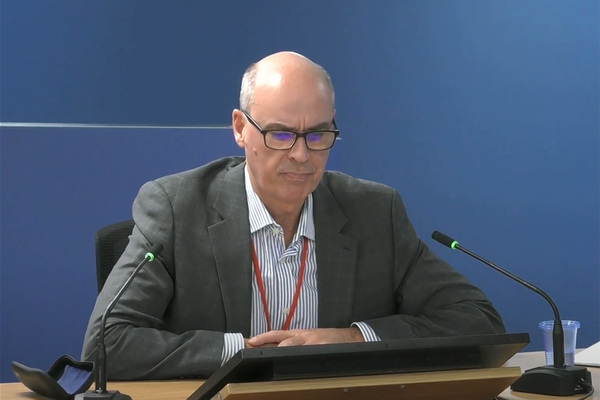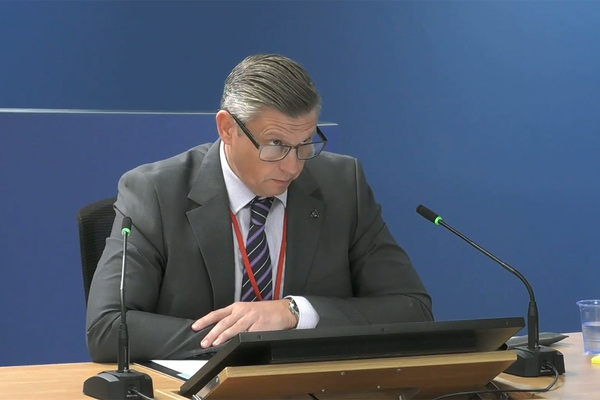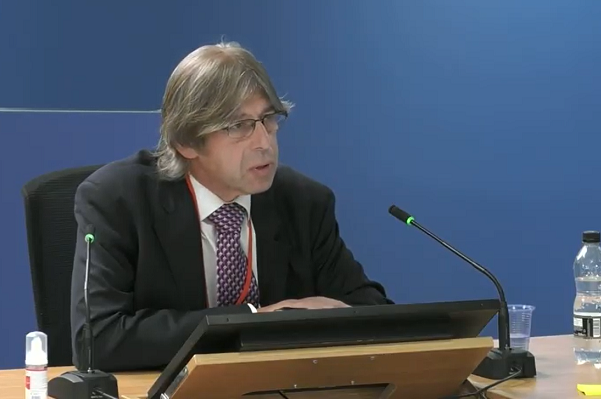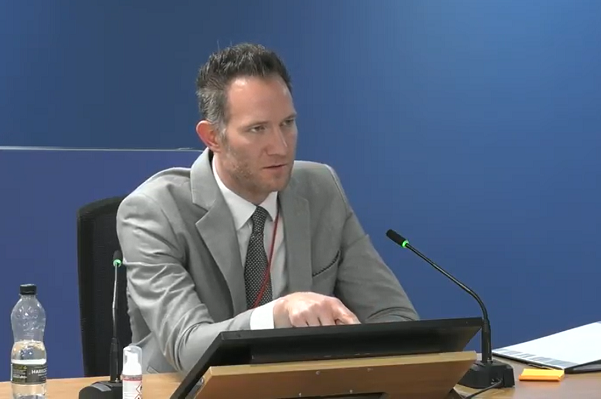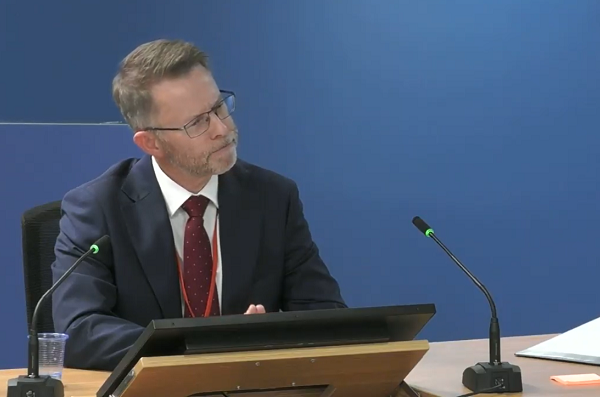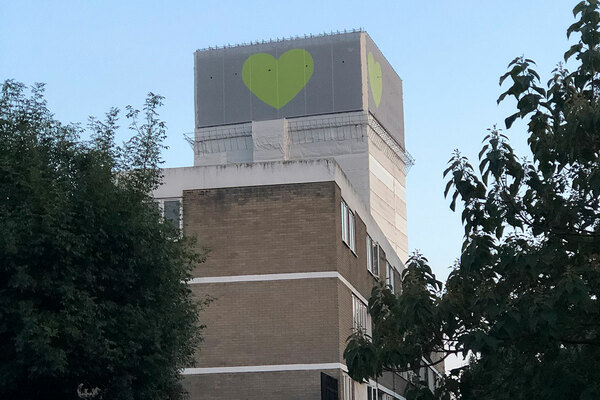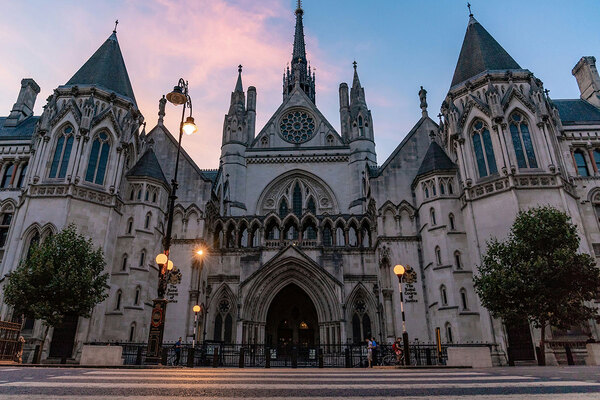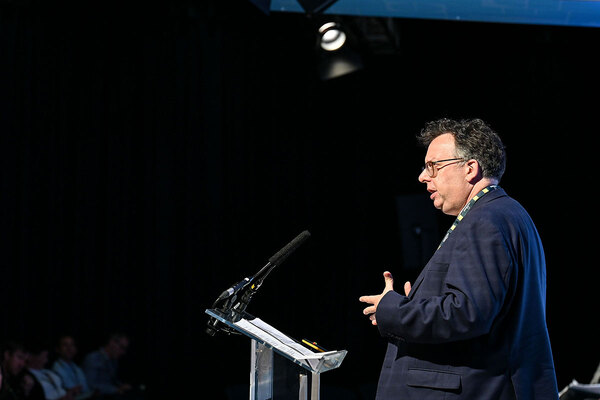Grenfell Tower Inquiry diary week 13: ‘Value for money is to be regarded as the key driver for the project’
With consultants to Kensington and Chelsea Tenant Management Organisation (KCTMO) giving evidence, attention at the Grenfell Tower Inquiry turned for the first time to the actions of the TMO and the council. Pete Apps reports.
What was Artelia’s role?
Artelia was engaged as the consultant advising KCTMO on its management of the refurbishment.
It is not unusual for social housing managers to bring in expert advisors to help them navigate a tricky construction project. That is what Artelia was paid to do – ensure KCTMO got good value from the contractors it was bringing in and help manage the work so it was completed on time and in budget.
So what did we learn from Artelia’s evidence?
‘Value for money is to be regarded as the key driver for the project’
A crucial aspect surrounded a review of the project in spring 2013. At this point, the work was stalling.
Leadbitter – the firm that was building a school and leisure centre next to the tower – had also been engaged to conduct Grenfell’s refurbishment, but things were not going well.
Leadbitter and Artelia were negotiating the cost of the work, with Leadbitter valuing it at more than £10m – £1.2m more than Artelia’s estimate, which was itself still substantially more than KCTMO’s budget of £8.5m.
Laura Johnson, director of housing at the Royal Borough of Kensington and Chelsea (RBKC), had exchanged testy emails with Leadbitter, describing the situation as “far from satisfactory”, refusing to put up more money and threatening to find a new contractor.
Artelia was asked to advise on the way forward. It said the delay was related to multiple failures, including the development of the plans in a “piecemeal” fashion and the “absence of a controlled and managed scope”.
But the firm recommended against taking Leadbitter off the project, saying this would “incur additional time and expense” without any guarantee that a replacement could do better.
Instead, the scheme should be stopped and revised. “Unless the project, in its current guise, is stopped and a review embarked upon to redefine the scope, programme and cost, it will fail,” the firm wrote.
“In essence, is this right, Mr Cash? The real problem here was that the TMO simply couldn’t afford the project as designed within the existing budget?” counsel to the inquiry Richard Millett QC asked Simon Cash (pictured), project director at Artelia.
“Correct,” he replied.
But this advice was not acted upon. According to an email, Ms Johnson overruled Peter Maddison, who was leading the project for the TMO. Getting the project done quickly was no longer the priority – value for money would be.
“She had effectively told him that what she wanted would basically take precedence over what Peter Maddison was trying to achieve, and as, I suppose, the major funder for the project… he obviously had to take cognisance of what she was saying,” explained Mr Cash.
From now on, the project would put ‘value for money’ – or cost-saving – at its heart and Leadbitter would be replaced with another contractor appointed through a tender.
In a project meeting, it was noted that “value for money is now the primary driver for the project”.
“Was that a polite way of saying that RBKC and TMO were now interested in doing the works as cheaply as possible, even if that took longer?” Kate Grange QC, the inquiry’s other counsel, asked a later witness, project manager Philip Booth.
“There’s three primary drivers in projects: price, quality and time. Which one’s the most important to you will… help you make decisions,” he replied. “It doesn’t mean you throw the others out, but, yes, if you want to bring the price down, then it might take a bit longer, and that’s what’s being requested here.”
‘So you were basically strong-armed into making these changes?’
As a result of the refocusing on value for money, Artelia rewrote its report, removing the recommendation to stick with Leadbitter.
Mr Cash and Mr Booth explained that as it was no longer important to stick to a tight timescale, it was now worth pursuing the opportunity to drive the cost down through open tendering.
But that was not all that changed in the report – references to the TMO’s poor management were also removed.
In an email to Mr Maddison, Mr Cash wrote: “I have taken on board your comments and reworded sections to read in a better light.”
“He wanted you to produce a report that was less critical of the TMO?” asked Mr Millett.
“Peter Maddison and I had had a particularly strong conversation about the changes that had to be made. He was being very persistent and put a lot of pressure on us to make those changes,” explained Mr Cash. “I was quite resistant because I felt that it was a true reflection of what had happened on the project, but at the same time, this was a report that Peter Maddison was looking to present to his board… if we didn’t make the changes, then the report wouldn’t be presented to the board and therefore no decision would be made.”
“So you were basically strong-armed into making these changes?” asked Mr Millett.
“Yes,” replied Mr Cash.
‘The informal information that Rydon were in pole position was irregular and improper, yes?’
Leadbitter was then dropped from the project and attention turned to securing a new contractor.
A notice was published in the Official Journal of the European Union in August 2013. Five contractors returned ‘pre-qualification questionnaires’ answering questions about their suitability to do the job, which were then scored.
Rydon came flat last – scoring 51 points out of 100. Another bidder, Mullaley, was awarded 69.5.
But this was just the pre-qualification check, not the formal bid,. When Rydon submitted its bid, it quoted £9.2m, while its two competitors, Durkan and Mullaley, offered £9.94m and £9.89m respectively.
“What did they miss?” Mr Cash wrote in an email. He dismissed this as a “light-hearted quip”.
The bids were scored 60% on potential quality and 40% on price.
The tendering process continued through to April, when Rydon was formally notified it was the preferred bidder.
But low as Rydon’s bid had been, it was not low enough for the TMO, which had a budget of £8.5m. In discussion with the TMO, Mr Cash suggested “an offline discussion” with the preferred contractor to explain that the price would have to come down further.
Asked if this shocked him, Mr Cash said: “Well, yes, I wouldn’t expect that of an organisation [like] the TMO”
The problem was the opportunity to offer further cost savings should have been given to the other bidders as well. Why were they not approached?
“We felt that the difference between the tenderers in terms of what had already been evaluated was such that there was only really one player in the process now,” said Mr Cash.
He felt Rydon should have been notified that cost reductions were necessary, but detailed discussions about them should not have been entered into until the formal legal process concluded. He said that he was not “entirely comfortable” with this, but added again that he felt “put under pressure” by the TMO to agree.
However, the TMO went further still, asking Rydon to try to find £800,000 of savings before being formally awarded the contract. Asked if this shocked him, Mr Cash said: “Well, yes, I wouldn’t expect that of an organisation [like] the TMO.”
Another email showed the TMO had given Rydon a tip-off that it was “in pole position – ours to lose”. Mr Cash said this could have “voided” the tender process.
“So the informal information that Rydon were in pole position, ‘ours to lose’, was irregular and improper, yes?” asked Mr Millett.
“Yes,” replied Mr Cash.
‘They were very much about, “Do we need this role? You know, it’s 30 grand” or whatever it was’
Another revelation this week was that the TMO declined the services of a client design advisor (CDA) to reduce its expenditure on the project.
This advisor would have been Richmal Hardinge, an architect with 15 years’ experience, who could have overseen the design process and reviewed the drawings for compliance with “British and European standards”. But the TMO did not want to make this appointment. Instead, it opted to take on this responsibility in-house.
“The TMO’s budget, as you can clearly see, was a consideration on this project and they didn’t want to incur the additional fees,” he said.
“Did they expressly say that to you: ‘We don’t want to incur the additional fees?’’’ asked Ms Grange.
“Well, yes, they were very much about, ‘Do we need this role? You know, it’s 30 grand’ or whatever it was,” said Mr Booth.
He added: “I think she was reassured that there were specialist cladding designers coming in and there were warranties which related to the products. I said: ‘Yes, but you will still need to sign it off.’”
An email from Claire Williams, project manager at KCTMO, said she believed the design advisor would not “particularly apply to cladding” as this was “designed and under guarantee”.
But Mr Booth said this contradicted the advice he gave her: “I was saying that while you might know social housing and what the right thing is for a kitchen, a CDA will be able to do everything; otherwise, you will have to do it yourself.”
Asked to what extent cost-saving drove this decision, he said: “It certainly was a consideration, but it wasn’t the only part. They genuinely believed they could do the job themselves and were best placed to do it.”
Mr Booth also said that in hindsight, he may have pushed harder for KCTMO to reverse this decision as the project developed. “Maybe Richmal may have picked up some of the issues that have gone on.”
As we have seen, there were multiple, serious ways in which the deadly cladding designs did not comply with regulations or guidance.
‘This was shoddy, this was clumsy, this was frustrating’
Towards the end of the project, the relationship between Artelia and Rydon declined severely, with Artelia increasingly critical of Rydon’s performance.
This largely came to the fore when Neil Reed (pictured), head of project delivery at Artelia, joined the project to ensure it concluded smoothly. He quickly became frustrated with Rydon’s failure to stick to the agreed programme and made his thoughts known in some strongly worded emails.
He said he believed there was an “inadequate workforce on site” to install the cladding – just seven workers. In another email he called Rydon’s management “shoddy” and said the firm was “apathetic to our efforts to help”.
Asked to explain these comments, he said clerk of works inspectors were arriving for scheduled inspections to find work wasn’t ready and previous observations had not been addressed.
This frustration with Rydon continued to the point where he drafted a formal complaint in March 2016. He said this was a step he had “never had to take before”
“So this was shoddy, this was clumsy, this was frustrating,” he said.
This frustration with Rydon continued to the point where he drafted a formal complaint in March 2016. He said this was a step he had “never had to take before”.
He originally wrote in the complaint: “Our biggest issue remains what appears an extremely lacklustre approach to completing the project with no real sense of urgency, willingness nor commitment from the Rydon team.
“It just doesn’t feel like this project is important to Rydon or that you have grasped what success will look like for the client in May [when the project was due to end].”
However, Mr Reed said the latter paragraph was eventually removed from the complaint because the TMO believed it was “a little emotive”.
‘Claire considers Artelia’s efforts in this regard appalling’
Artelia was also the project’s construction, design and management (CDM) co-ordinator, which involved collating documents relevant to the health and safety features of the building into a health and safety file.
This role was governed by EU regulations and midway through the project, these regulations changed – rather than a CDM co-ordinator, the file now had to be compiled by a principal designer.
A long process of trying to appoint a principal designer ensued. This ultimately resulted in TMO deciding to take on the role itself after unsuccessfully asking Rydon to do it.
Artelia sought to hand the health and safety file over to the TMO, but the file was missing key documents and drawings. Some of these related directly to the cladding system, such as product specifications and certifications.
“With the greatest of respect, I don’t think this can be dumped on the client like this,” Mr Booth wrote in an internal email.
After a missed handover, the TMO lost its patience.
“Despite all the effort to ensure a smooth transition re CDM Claire considers Artelia’s efforts in this regard appalling,” Mr Reed wrote. “Andrew and I were quite embarrassed by the lack of professional closure.”
The Artelia witnesses said this related simply to the missed meeting and the file was only incomplete because the project had not finished.
Culture of bullying
On Monday, the inquiry heard from John Allen, head of building control at RBKC, who denied there was a “culture of bullying” in the department. You can read our report of that day’s evidence here.
Next week, the inquiry will hear the first witnesses from the TMO.
Grenfell Tower Inquiry headlines: week 13
Head of RBKC building control denies 'culture of bullying' at the council
The head of building control at the Royal Borough of Kensington and Chelsea (RBKC), John Allen, has denied accusations of a “culture of bullying” in his department at the time of the Grenfell Tower refurbishment, the inquiry has heard.
KCTMO 'strong-armed' consultant into removing criticism of its management of Grenfell refurbishment
The consultant who advised Kensington and Chelsea Tenant Management Organisation (KCTMO) on the Grenfell Tower refurbishment was “strong-armed” into removing criticism of the organisation from a report, the inquiry into the fire heard yesterday.
KCTMO rejected design advisor for Grenfell 'to save money on fees'
The company which managed Grenfell Tower decided not to appoint a design advisor who could have checked the proposals for the deadly cladding system in order to save money on its consultancy fees, the inquiry into the fire heard today.
Grenfell Tower Inquiry phase two: weekly diaries
Module one: the refurbishment
Week one: A vivid picture of a broken industry
After a week of damning revelations at the opening of phase two of the Grenfell Tower Inquiry, Peter Apps recaps the key points
Click here to read the full story
Week two: What is the significance of the immunity application?
Sir Martin Moore-Bick has written to the attorney general requesting protection for those set to give evidence at the Grenfell Tower Inquiry. Peter Apps explains what the move means
Click here to read the full story
Week three: Architects of misfortune
This week saw the lead architects for the Grenfell Tower refurbishment give evidence to the inquiry. Peter Apps runs through the key points
Click here to read the full story
Week four: ‘I didn’t have any perception that it was the monster it’s become’
The architects continued to give evidence this week, outlining a lack of understanding of the fire risk posed by the cladding materials and its design. Nathaniel Barker reports
Click here to read the full story
Week five: ‘No adverse effect in relation to external fire spread’
As the Grenfell Tower Inquiry returns from its long absence, Peter Apps recaps the key points from a week of important evidence from the fire consultants to the refurbishment
Click here to read the full story
Week six: ‘I can’t recall any instance where I discussed the materials with building control’
Nathaniel Barker summarises what we learned from fire engineers Exova, architects Studio E and the early evidence from contractor Rydon
Click here to read the full story
Week seven: ‘I do not think I have ever worked with a contractor operating with this level of nonchalance’
Two key witnesses from contractor Rydon gave evidence this week. Peter Apps recaps some of the key points from a revealing week of evidence
Click here to read the full story
Week eight: ‘It haunts me that it wasn't challenged’
Four witnesses from contractor Rydon gave evidence this week. Lucie Heath recaps what we learned on the last week of evidence before the inquiry breaks for five weeks
Click here to read the full story
Week nine: ‘All I can say is you will be taken out for a very nice meal very soon’
This week the inquiry heard evidence from witnesses at Harley Facades, the sub-contractor responsible for Grenfell Tower’s cladding. Peter Apps recaps the key points
Click here to read the full story
Week 10: ‘As we all know, ACM will be gone rather quickly in a fire!’
As the Grenfell Tower Inquiry entered its 10th week, Jack Simpson recaps the key points from a week of important evidence from the refurbishment’s cladding contractor
Click here to read the full story
Week 11: ‘Did you get the impression Grenfell Tower was a guinea pig for this insulation?’
With witnesses from the cladding subcontractor, the firm which cut the deadly panels to shape and the clerk of works which inspected the job giving evidence this was week full of revelations. Peter Apps recaps the key points
Click here to read the full story
Week 12: ‘Would you accept that was a serious failing on your part?’
With the surveyor who inspected Grenfell Tower for compliance giving evidence, this was a crucial week from the inquiry. Dominic Brady and Peter Apps report
Click here to read the full story
Week 13: ‘Value for money is to be regarded as the key driver for this project’
With consultants to Kensington & Chelsea Tenant Management Organisation (KCTMO) giving evidence, attention at the Grenfell Tower Inquiry turned for this first time to the actions of the TMO and the council. Peter Apps reports
Click here to read the full story
Week 14: ‘Did it not occur to you at this point that your budget was simply too low?’
This week, for the first time in phase two, the inquiry heard from Kensington & Chelsea Tenant Management Organisation, the landlord that oversaw the fatal refurbishment of Grenfell Tower. Lucie Heath reports
Click here to read the full story
Week 15: ‘Have you ever informed the police that you destroyed documents relevant to their investigation?’
Witnesses from the Kensington and Chelsea Tenant Management Organisation (KCTMO) gave evidence for a second week, which began with a shocking revelation about withheld and destroyed evidence. Peter Apps recaps
Click here to read the full story
Week 16: ‘I conclude this was very serious evidence of professional negligence’
This week saw members of Kensington & Chelsea Tenant Management Organisation finish giving evidence, before the inquiry’s expert witnesses took the stand to make some highly critical assessments of the work they had seen before and during the refurbishment of Grenfell Tower. Jack Simpson recaps
Click here to read the full story
Grenfell Tower: a timeline of the refurbishment
Following the conclusion of module one of the Grenfell Inquiry’s second phase, Peter Apps presents a timeline of the key moments during the fatal refurbishment of the west London tower block
Click here to read the full story
Module two: the cladding products
Week 17: ‘It’s hard to make a note about this because we are not clean’
The start of the second module of the Grenfell Tower Inquiry phase two came with some huge revelations about the companies that sold the products used in the cladding system. Peter Apps reports
Click here to read the full story
Week 18: ‘It was just reckless optimism wasn't it?’
As the inquiry began cross-examining witnesses for the second module of its phase two work, the picture surrounding just how Grenfell Tower ended up wrapped in such dangerous materials became a little clearer. Nathaniel Barker was keeping an eye on proceedings
Click here to read the full story
Week 19: ‘And that was intentional, deliberate, dishonest?’
The Grenfell Tower Inquiry this week heard the shocking story of how the insulation manufacturer “manipulated” official testing and marketed its product “dishonestly”. Peter Apps tells the story
Click here to read the full story
Week 20: ‘We were outed by a consultant who we then had to fabricate a story to’
This week the inquiry investigated the actions of Kingspan – the manufacturer of one of the insulation products used in the tower’s cladding system. Dominic Brady reports
Click here to read the full story
Week 21: ‘It’s there in black and white isn't it? We see a complete absence of any consideration of life safety’
The story of insulation giant Kingspan’s testing and marketing of its combustible insulation for high rises was unpacked in minute detail this week. Peter Apps reports
Click here to read the full story
Week 22: ‘All we do is lie in here’
In the third week of evidence from insulation giant Kingspan, the inquiry continued to uncover shocking details about the firm’s behaviour both before and after the Grenfell Tower fire. Lucie Heath reports
Click here to read the full story
Week 23: ‘That would have come as an earthquake to you at the time, would it not?’
This week the inquiry took its deepest dive yet into the inner workings of the cladding manufacturer whose product has been blamed for the terrible spread of fire up Grenfell Tower. Nathaniel Barker reports
Click here to read the full story
Week 24: ‘Do you accept that Test 5B was Arconic's deadly secret’
The president of the firm that made and sold the cladding panels installed on Grenfell Tower was asked to account for the apparent concealment of “disastrous” fire tests on the product this week. Peter Apps reports
Click here to read the full story
Week 25: ‘This is quite an incredible list of omissions and missed instances, isn’t it?’
This week the Grenfell Tower Inquiry heard its first witnesses from the Building Research Establishment (BRE) - the testing house which carried out key fire tests on the Kingspan and Celotex insulation products which were later used on Grenfell Tower. Peter Apps reports.
Click here to read the full story
Week 26: 'You were taking an enormous risk, weren't you?'
Week 26 at the Grenfell Tower Inquiry was a key moment in understanding how dangerous products used on the tower came to be accepted by industry professionals. Dominic Brady reports
Click here to read the full story
Week 27: ‘What will happen if one building made out [of] PE core is in fire and will kill 60 to 70 persons?’
The most explosive evidence this week at the Grenfell Tower Inquiry came from those who did not attend, as the evidence which would have been presented to Arconic witnesses was displayed in their absence. Peter Apps reports
Click here to read the full story
Week 28: ‘This is a serious safety matter’
This week the Grenfell Tower Inquiry zeroed in on the British Board of Agrément, the body that produced “misleading” certificates which inspired trust in both the cladding and insulation used on the tower. Lucie Heath reports
Click here to read the full story
Week 29: ‘Is it true that Kingspan’s position… was to do its best to ensure that science was secretly perverted for financial gain?’
The final week in this section of the Grenfell Tower Inquiry primarily examined the attempts by insulation manufacturer Kingspan to lobby government after the fire. Peter Apps reports
Click here to read the full story
How the products used in Grenfell Tower's cladding system were tested and sold
As the section of the Grenfell Tower Inquiry examining how the products used in the cladding system were tested, marketed and sold comes to a close, Peter Apps summarises what we have learned about each of the products included in the system
Click here to read the full story
Module Three: the management of the tower
Week 30: ‘There is certainly a high probability that in the event of a fire the whole building can become an inferno’
The focus of the inquiry shifted this week to the actions of the social housing providers responsible for maintaining Grenfell Tower. Pete Apps recaps what we learned
Click here to read the full story
Week 31: ‘If we cannot get out people will die’
This week saw the former residents of Grenfell Tower enter the witness box to tell of their experiences attempting to raise complaints with the council and its managing agent. Pete Apps reports
Click here to read the full story
Week 32: ‘Let's hope our luck holds and there isn't a fire’
This week saw the return of the landlord of Grenfell Tower, Kensington and Chelsea Tenant Management Organisation (KCTMO), as senior staff members attempted to explain how vital fire safety protections at the block were allowed to fall into disrepair. Lucie Heath reports
Click here to read the full story
Week 33: ‘Isn't that a serious gap in the scope of a policy meant to safeguard vulnerable people?’
A slightly disjointed week at the Grenfell Tower inquiry saw further evidence from staff at building manager Kensington and Chelsea Tenant Management Organisation (KCTMO) interspersed with the views of a cladding expert. Peter Apps reports
Click here to read the full story
Week 34: ‘Some members of the community are doing their best to spread false information’
Jack Simpson covers all the major revelations from the past week of evidence at the Grenfell Inquiry, including evidence from Laura Johnson, director of housing at the Royal Borough of Kensington and Chelsea.
Click here to read the full story
Week 35: ‘I really didn’t like the champagne’
This week the Grenfell Tower Inquiry saw council witnesses, including former deputy leader Rock Feilding-Mellen and leader Nicholas Paget-Brown, questioned about their role in the story for the first time. Peter Apps reports
Click here to read the full story
Week 36: ‘Is that not a very incurious approach for a fire risk assessor?’
This week the Grenfell Tower Inquiry scrutinised the work of Carl Stokes, the man hired to carry out fire risk assessments for the block. Nathaniel Barker reports
Click here to read the full story
Week 37: ‘In giving that advice, weren’t you acting beyond your knowledge and expertise?’
A curtailed week at the Grenfell Tower Inquiry saw fire risk assessor Carl Stokes grilled over advice he gave regarding the tower’s cladding. Peter Apps reports
Click here to read the full story
Week 38: ‘Well it’s a bit more than that, isn’t it. He’s suggesting that you tell the LFB a lie’
The inquiry heard the mammoth cross-examination of KCTMO’s health and safety manager Janice Wray this week. Peter Apps reports
Click here to read the full story
Week 39: ‘What you said there was a grotesque understatement’
This week the inquiry continued to hear from former employees of Kensington and Chelsea Tenant Management Organisation, as well as two employees from the London Fire Brigade. Lucie Heath reports
Click here to read the full story
Week 40: ‘An exercise in concealment and half-truth’
Former KCTMO chief executive Robert Black gave his evidence to the inquiry this week and was asked to account for the various failures described over the previous six weeks. Peter Apps and Nathaniel Barker report.
Click here to read the full story
Week 41: ‘We should do nothing. This is not the sort of website we should be responding to’
This week saw the return of Robert Black, chief executive of Kensington and Chelsea Tenant Management Organisation (KCTMO), before the inquiry turned its attention to the defective smoke control system in the tower. Dominic Brady reports
Click here to read the full story
Week 42:‘They would leak as much as they leaked. They were what they were’
The Grenfell Tower Inquiry continued its in-depth investigation of the tower’s non-compliant smoke control system this week, with evidence from the various contractors involved in delivering it. Pete Apps reports
Click here to read the full story
Week 43:‘Contractors at the time were not generally aware of the importance of leaving holes unsealed’
This week the inquiry focused on two of the more overlooked areas of the Grenfell Tower fire, with evidence focusing on the gas pipelines and lifts within the west London block. It was a packed week, with five witnesses giving evidence. Jack Simpson reports
Click here to read the full story
Week 44:‘I've never seen a fully compliant firefighting lift in any local authority building, to this day actually’
This week the inquiry turn the focus onto the building’s defective lifts, with evidence from an expert, contractors who worked on them and a former engineer at KCTMO. Pete Apps reports.
Click here to read the full story
Week 45: ‘Don’t you find all this rather a surprising debate, given that the Equality Act was passed in 2010?’
The inquiry heard from expert witness Colin Todd this week, who gave his views about the work of risk assessor Carl Stokes as well as answered questions about his own guidance. Peter Apps and Nathaniel Barker report
Click here to read the full story
Week 46: ‘I think I've been very, very clear that is completely wrong’
This week the inquiry heard further expert evidence about fire risk assessor Carl Stokes’ actions, as the section of its work covering the management and maintenance of the tower concluded. Peter Apps reports
Click here to read the full story
Six key failures in the way Grenfell Tower was managed before the fire
Peter Apps recaps some of what we have learned about the actions of the Royal Borough of Kensington and Chelsea (RBKC) and Kensington and Chelsea Tenant Management Organisation (KCTMO) in the years before the fire.
Module one and two closing statements
Week 47: ‘An unedifying spectacle’
After a week of closing statements from the core participants involved in modules one and two, Lucie Heath recaps the key arguments of each group
Click here to read the full story
Module five: the fire brigade
Week 48: ‘They knew, and lives could and should have been saved’
The phase of the Grenfell Tower Inquiry examining the actions of the London Fire Brigade in the years before the fire kicked off this week with some major revelations. Peter Apps reports
Click here to read the full story
Week 49: ‘I'm not sure we've always taken every opportunity to learn as an organisation’
How the London Fire Brigade acted upon lessons from incidents in the years before the Grenfell Tower disaster came under the microscope this week at the public inquiry. Nathaniel Barker reports
Click here to read the full story
Week 50: ‘There is a culture in LFB that is very conservative. I think there is great comfort in what is familiar’
This week the inquiry heard how the London Fire Brigade (LFB) elected not to issue warnings about dangerous cladding before Grenfell and a detailed examination of its policy for checking high risk buildings. Pete Apps reports.
Click here to read the full story
Week 51:‘We teach firefighters to expect building failure’
An unusually brief week of evidence at the Grenfell Tower Inquiry explored how a fire service neighbouring London was taking a different approach to tackling blazes in high rises. Nathaniel Barker reports
Click here to read the full story
Week 52: ‘I actually think that there is a measure of incompetence at all levels’
Expert evidence concluded the current section of the inquiry with some stinging criticism of the London Fire Brigade (LFB). Pete Apps and Grainne Cuffe report.
Click here to read the full story
Module six: fire services
Week 53: ‘They make for chilling reading and harrowing listening’
The inquiry’s investigation into central government began this week with lawyers setting out their view on how and why firefighting policies failed. Peter Apps and Lucie Heath report
Click here to read the full story
Week 54: ‘Our consideration of evacuation at this time was something of a blind spot’
The development of policy on ‘stay put’, both nationally and for London, occupied the attention of the inquiry this week. Peter Apps reports
Click here to read the full story
Week 55: ‘My review is pretty scathing!’
In a week that included the 200th day of evidence in phase two of the inquiry, attention turned to the London Fire Brigade’s control room. Lucie Heath reports
Click here to read the full story
Week 56: ‘Why didn't we thump the table harder’
This week, the control room at the London Fire Brigade was examined further – both before and after the fire. Pete Apps and Lucie Heath report
Click here to read the full story
Week 57: ‘It was worse than slow, it was sluggish’
Former London Fire Brigade (LFB) commissioner Dany Cotton was the star witness this week, as the inquiry continued to delve into the brigade’s knowledge and training before the Grenfell Tower fire. Jack Simpson, Grainne Cuffe and Pete Apps report
Click here to read the full story
Week 58: ‘I don't think we deserve to ask for trust until we demonstrate different outcomes’
A current and former commissioner of the London Fire Brigade (LFB) wrapped up the inquiry’s investigation into the actions of the brigade before the fire. Grainne Cuffe and Peter Apps report.
Module six: testing and government
One of the major scandals of our time: key revelations as the Grenfell Tower Inquiry turns to government
The government was accused of “covering up” the risks of dangerous cladding as its “unbridled passion for deregulation” left it a “junior party” to the construction industry as the latest phase of the public inquiry opened today. Peter Apps summarises some of the main points
Click here to read the full story
Week 59: ‘Recent tests have apparently shown it continued to burn for 20 minutes after the flame was taken away’
After shocking opening statements, the Grenfell Tower Inquiry turned its attention to the work of Local Authority Building Control. Pete Apps reports
Click here to read the full story
Week 60: ‘You could have an exact repeat of the Dubai fire in any number of buildings in London’
The Grenfell Tower Inquiry turned its attention to the work of the National House Building Council this week, with shocking revelations about the extent of the warnings issued to central government before the fire. Peter Apps reports
Click here to read the full story
Week 61: ‘Mistakes are meant for learning, not repeating’
In the first hearings of the new year, the Grenfell Tower Inquiry heard closing statements from the firefighting section of phase two. Lucie Heath reports
Click here to read the full story
Week 62: Did it ever occur to you that this act of collaboration was, in one sense, corrupting?
The Grenfell Tower Inquiry returned to the work of the National House Building Council (NHBC) this week, with a new shocking revelation about the government’s actions in the immediate aftermath of the fire. Peter Apps reports
Click here to read the full story
Week 63: ‘It came after the general move to deregulation. So more regulation was not welcome’
The government’s focus on deregulation before the Grenfell Tower fire was placed in the spotlight this week with a series of shocking revelations about its failure to amend fire safety guidance. Pete Apps and Grainne Cuffe report
Click here to read the full story
Week 64: ‘I didn’t think ACM would be suitable for use in any high-rise buildings. I don’t think anyone did’
This week, the Building Research Establishment’s Dr Sarah Colwell gave more than three days of evidence, with some huge revelations about what was known about the dangers of aluminium composite material years before the fire and the mass confusion over the government’s building regulations. Peter Apps and Jack Simpson report
Click here to read the full story
Week 65: ‘Unless the government does something now about ACM panels, people will die’
Further evidence from the Building Research Establishment and the first government witnesses added new depth to our understanding of how warnings were missed before the Grenfell Tower fire. Peter Apps reports
Click here to read the full story
Week 66: ‘Was there a cover-up?’
The latest evidence from the Grenfell Tower Inquiry tracked the government’s failure to act on fire safety warnings right up until the months before the fire. Peter Apps and Grainne Cuffe report
Click here to read the full story
Week 67: ‘When exposed to a fire, the aluminium melts away and exposes the polyethylene. Whoosh!’
This week the inquiry heard disturbing new evidence about the failure of senior government officials to act on warnings about dangerous cladding in the years before the Grenfell Tower fire. Peter Apps reports
Click here to read the full story
Week 68: ‘Can we agree that was a pretty dangerous thing to have, all this falling on one man’s shoulders?’
Three senior civil servants gave evidence this week, including the official who had responsibility for building regulations guidance on fire safety in the years before Grenfell. Peter Apps, Lucie Heath, Stephen Delahunty and Grainne Cuffe report
Click here to read the full story
Week 69: ‘It was just unthinkable. You had the makings here of a crisis you could not comprehend’
This week, civil servant Brian Martin gave his long-awaited evidence to the Grenfell Tower Inquiry. Peter Apps reports
Click here to read the full story
Week 70: ‘Show me the bodies’
An important week at the Grenfell Tower Inquiry saw a dramatic conclusion to the mammoth cross-examination of civil servant Brian Martin, as well as the first politicians. Peter Apps and Lucie Heath report
Click here to read the full story
Week 71: ‘I have changed my schedule to fit this in. I do have an extremely busy day meeting people’
Three politicians who were responsible for building regulations before Grenfell appeared before the inquiry this week, including the former communities secretary Eric Pickles, who responded to the coroner’s letter following the Lakanal House fire. Peter Apps and Lucie Heath report
Click here to read the full story
Module Four: aftermath
Week 72: 'The system isn't broken. It was built this way'
This week the inquiry turned to the shocking story of the lack of support for bereaved and survivors in the immediate aftermath of the Grenfell Tower fire. Peter Apps, Lucie Heath, Grainne Cuffe and Jack Simpson report
Click here to read the full story
Week 73: ‘Most people would regard that as hopeless’
This week, the Grenfell Tower Inquiry heard about the Royal Borough of Kensington and Chelsea’s chaotic response in the immediate aftermath of the blaze, from the staff responsible for it. Pete Apps, Stephen Delahunty and Grainne Cuffe report
Click here to read the full story
Week 74: ‘Do you agree that RBKC was ill-prepared and incapable to meet its duties’
This week, Nicholas Holgate, former chief executive of the Royal Borough of Kensington and Chelsea, was grilled on his failure to hand over control of the aftermath of the fire, despite the borough’s lack of capacity. Peter Apps reports
Click here to read the full story
Week 75: ‘It still shocks me to the core that that’s how we treat our citizens in this country’
This week the inquiry heard witnesses from the housing management body discuss their role in the aftermath of the Grenfell Tower fire, followed by a range of witnesses from other organisations which supported the response. Peter Apps and Grainne Cuffe report
Click here to read the full story
Week 76: ‘I fear this will become our New Orleans’
This week the inquiry heard from central government figures and members of the London-wide emergency response arrangements. Peter Apps and Grainne Cuffe report
Click here to read the full story
Week 77: ‘The planning wasn’t done and there was nothing for us to be drawing on’
The Grenfell Tower Inquiry’s examination of the aftermath of the fire concluded with witnesses from central government. Peter Apps reports
Click here to read the full story
Module seven: expert evidence and closing statements
Week 78: ‘The abandonment of the ‘stay put’ strategy for high-rise residential buildings is essential’
This week the Grenfell Tower Inquiry heard a range of expert witnesses discuss their reports. Peter Apps and Grainne Cuffe report
Click here to read the full story
Week 79: ‘You could argue the system was created to enable people to circumvent the rules’
The Grenfell Tower Inquiry continued to hear expert evidence this week, with two senior figures in the world of fire safety academia criticising the government’s approach before and after the blaze. Peter Apps and Grainne Cuffe report
Click here to read the full story
Week 80: ‘The evidence points to wilful blindness and complacency towards safety’
As the inquiry moves into its final stages, lawyers for the key players gave statements about the evidence surrounding central government. Peter Apps reports
Click here to read the full story
Week 81: ‘This is Islamophobia. It’s racism. It is the elephant staring back at us in the room’
This week, closing statements covering the aftermath of the fire delivered a shocking new revelation and an expert toxicologist gave his views on the causes of the deaths. Peter Apps reports
Click here to read the full story
Module eight: further evidence relating to the deceased
Week 82: ‘Their chance to hear about the circumstances in which their loved ones died is the culmination of five years of waiting’
The Grenfell Tower Inquiry moved into its final module this week, with evidence relating to the circumstances in which the victims died. Peter Apps reports
Click here to read the full story
Week 83: ‘They died together as they lived: caring for one another’
A second week of evidence relating to the circumstances in which the victims of the fire died delivered more heartbreaking stories about their final moments. Peter Apps recaps
Click here to read the full story
Week 84: ‘Every decision affects someone who is an adored child, a beloved sister, a respected uncle, a needed mother’
The final week of oral evidence for the Grenfell Tower Inquiry’s second phase contained more heartbreaking evidence about the deaths in the tower. Peter Apps reports
Click here to read the full story
Closing statements
Week 85: ‘The merry-go-round turns still, the notes of its melody clearly audible in the last few days’
The Grenfell Tower Inquiry returned this week for closing statements from lawyers representing the bereaved and survivors and the various parties under scrutiny for the fire. Pete Apps reports.

